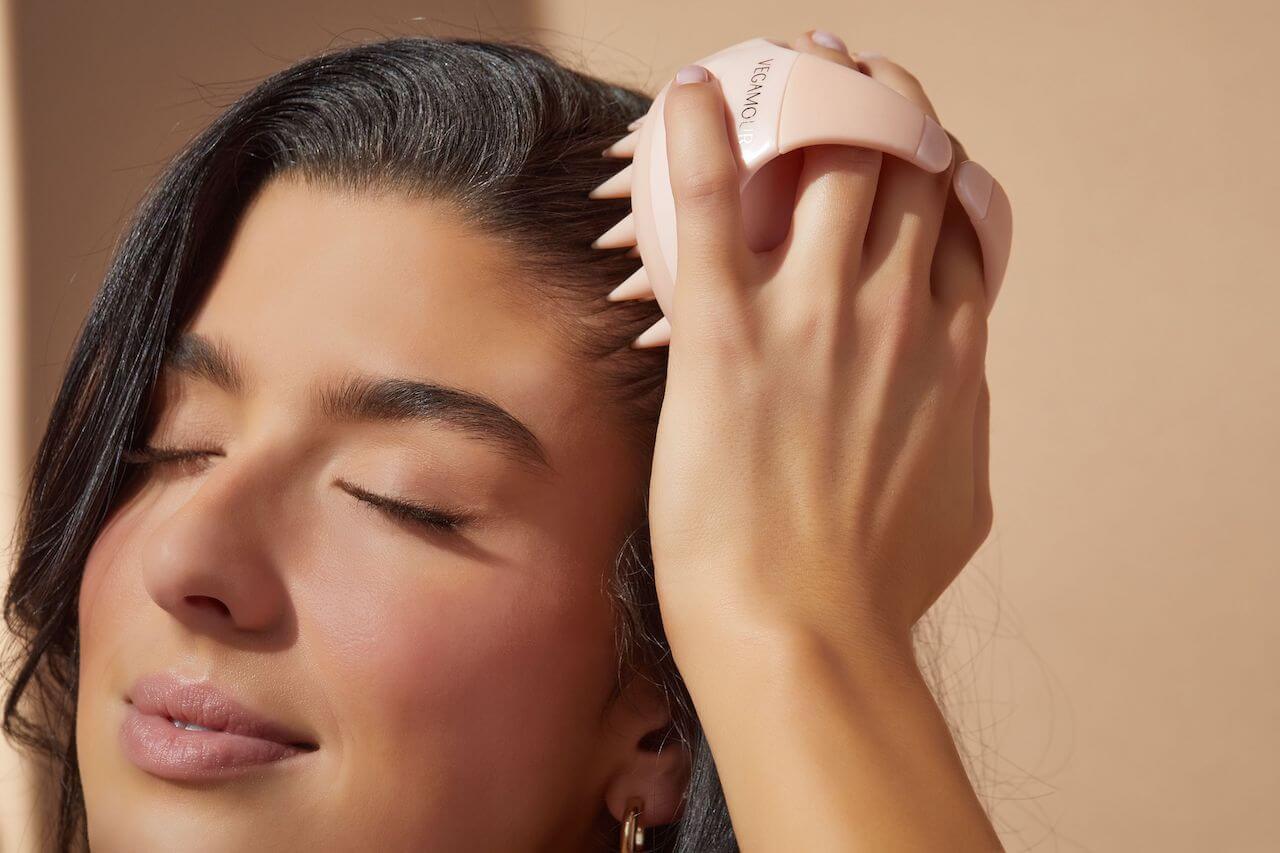If you’ve noticed a change in your health and your hair, you might be wondering if the two are connected. A variety of illnesses can contribute to hair loss.
Keep reading to explore a few of the most common illnesses that can cause hair thinning and hair loss, along with tips for how you can improve your hair wellness.
Hair Loss Is Complex
Dr. Enrizza P. Factor, a clinical dermatologist, said that many factors can cause hair loss, including a poor diet.
Hereditary hair loss and stress are some common causes of hair loss that affect millions of Americans, but there are also a variety of illnesses that could be at play too. Autoimmune conditions, hormone levels, infections and even poisoning could be involved in hair loss.
These 12 Illnesses Might Cause Hair Loss
While this list is not exhaustive, here are 12 illnesses that are commonly associated with hair loss.
Alopecia Areata
Alopecia areata is an autoimmune condition that leads to very distinctive and characteristic round bald patches that typically appear on the scalp but can happen elsewhere on the body too. Dr. Edward Salko, a board-certified physician and medical director of PersonaLabs, said that AA results from immune cells attacking hair follicles, which leads to hair loss.
Alopecia areata is often treated with corticosteroid injections to affected areas on the scalp, but it could also include immunomodulators or other oral medications to slow hair loss. Alopecia totalis and alopecia universalis are two more advanced forms of alopecia areata that could result in permanent hair loss.
Read More: What Is Alopecia Areata? One Type of Hair Loss Explained
COVID-19
While this virus is still an emerging discovery that has not yet been widely studied, there is a link between COVID-19 infections and subsequent hair loss triggered by a condition called telogen effluvium. This form of sudden hair loss, which can be triggered by any major illness or extreme stress to the body, such as surgery or the loss of a loved one, is typically only temporary and resolves on its own.
Read: Everything You Need to Know About Telogen Effluvium
Thyroid Disorders
The thyroid gland is an important part of our everyday health, and the hormones it produces are responsible for regulating cellular metabolism in both our hair and skin cells. Whether it's an overactive thyroid (called hyperthyroidism) or an underactive thyroid (called hypothyroidism), the impact can mean a disruption of hair follicle function.
“This thyroid hormone imbalance can result in hair loss — including hair on your head, body hair or eyebrows,” explained Dr. Yasmin. In most cases, addressing the underlying thyroid disease and hormonal imbalance with medication can help hair growth return to normal.
What You Need to Know: Thyroid Disorders and Hair Loss
Diabetes
Both type 1 and type 2 diabetes are believed to involve underlying autoimmune mechanisms and have been linked to hair loss. In some cases, decreased circulation to the scalp could be at play, but folks with diabetes also have a higher risk for other autoimmune diseases such as alopecia areata and immune-system-related thyroid diseases such as Hashimoto’s thyroiditis and Graves’ illness.
The Connection: Can Diabetes Cause Hair Loss?
Lupus
Lupus, also known as systemic lupus erythematosus or SLE, is another autoimmune disorder commonly tied to hair loss. While it could manifest as diffuse thinning hair over the whole scalp, anywhere from 14%-50% of people with lupus develop the patchy hair loss associated with alopecia areata.
Lupus and Hair Loss: Causes, Treatments and More
Scalp Infection
A scalp infection like tinea capitis (also called scalp ringworm) could be the cause of hair loss when left untreated. It is a common fungal infection that most often happens in children but is typically resolved with oral antibiotics.
Burning Question: Can Scalp Inflammation Cause Hair Loss?
Scalp Psoriasis
This chronic skin condition can cause thick, inflamed, silvery patches of skin on the scalp, though psoriasis can, and typically does, affect other parts of the body, too. While the condition does not cause hair loss itself, it can lead to hair loss if excessive itching damages hair follicles. It’s typically treated with topical medications, steroid injections and light therapy.
Scarring Alopecia
On a high level, alopecia (the medical term for hair loss) is often characterized as “non-scarring” and “scarring.” Non-scarring forms of alopecia, such as alopecia areata and telogen effluvium, for example, do not permanently damage follicles. However, forms of scarring alopecia do damage follicles, and the hair loss associated with this family of hair loss conditions can be permanent. “This is because the hair follicles are destroyed, turning their growth zone into scarring tissue,” explained Dr. Salko. One commonly seen form of scarring alopecia is frontal fibrosing alopecia (FFA), which is typically seen in women over 50 years of age.
Understand: Scarring Alopecias Explained
Sexually Transmitted Infections
Some sexually transmitted infections can cause hair loss, particularly when left untreated. Advanced cases of syphilis may cause patchy hair loss on the head, face and body, while HIV and AIDS are frequently associated with hair loss, due to the viral infection itself or because of secondary infections, nutritional deficiencies or hormonal changes.
Seborrheic Dermatitis
This condition is a form of eczema that can affect the scalp. Seborrheic dermatitis can be confused with common dandruff because it causes intense itching and flakes. However, the flakes tend to be more yellow in color and are accompanied by oily scalp and hair. This condition also doesn’t typically result in permanent hair loss, though when not treated, excessive itching can damage follicles in some people.
More: What You Should Know About Seborrheic Dermatitis
PCOS
Polycystic ovary syndrome (PCOS) is an autoimmune condition that affects about 15% of women. “In PCOS, testosterone or, more specifically dihydrotestosterone, (DHT) causes miniaturization of the hair follicles,” explained Dr. Gibran Shaikh, a board-certified dermatologist and founder of MySkinofColor.com. This condition is characterized by high levels of male hormones called androgens, such as DHT, that can also cause other symptoms like weight gain, acne and excessive hair on other parts of the body.
Find Out: The PCOS and Hair Loss Connection
Poisoning
Heavy metal poisoning, such as thallium or arsenic poisoning, can lead to a particular form of hair loss called anagen effluvium. With anagen effluvium, hair is shed while it’s in its active growing phase (the anagen phase), and typically, hair falls out heavily and suddenly. Patients undergoing chemotherapy and radiation treatment often experience anagen effluvium. Most often, anagen effluvium only causes temporary hair loss.
Learn: What Is Anagen Effluvium?
When To See a Doctor
It’s important to seek treatment from a doctor any time you notice distressing changes to your hair. In many cases, the best chances for returning to normal hair growth come with treating the underlying cause of the hair loss early. “A dermatologist can do a comprehensive blood workup in addition to a scalp biopsy to diagnose the cause of the hair loss,” explained Dr. Shaikh. Often treating the underlying illness is enough to resolve hair issues. A doctor can help you not only get to the root cause but also can provide you with treatment options.
A Holistic Approach to Health — and Hair
Hair loss is complex. If you’re experiencing hair loss related to an illness, it could be that treating the illness is all that is needed to stimulate regrowth. But there are several other tools you can put into your hair care toolkit to care for your hair holistically by supporting your general health and well-being.
Be Gentle
When dealing with thinning hair or loss, it’s important to be extra gentle to your scalp. That means avoiding color or other chemical treatments, along with heat styling whenever possible. Try to skip tight buns, ponytails or braids that can strain follicles, and consider swapping out harsh chemicals for natural, vegan hair-friendly shampoos and conditioners.
Eat a Healthy Diet
Healthy foods provide the building blocks for healthy hair. Our follicles need a wide variety of vitamins, minerals and other nutrients to function at their best. Nutritional deficiencies can impact hair growth, so be sure to eat a varied diet full of fruits, vegetables, whole grains, healthy fats and proteins.
When you need to supplement, consider options that are specifically formulated for hair health. Our GRO Biotin Gummies feature biotin in addition to folic acid, B vitamins, vitamins A, C, E and other vital nutrients to support optimal hair health.
Manage Stress
Stress impacts the body in so many ways, and hair follicles are not exempt. Stress is a contributing factor in various hair loss conditions and other illnesses, which can lead to hair loss. Adding stress management techniques to your daily life — techniques that could be as simple as spending more time in nature or deep breathing — can have beneficial impacts on your hair. Adding scalp massage with a scalp massager may work twofold by acting as both a way to relieve stress and stimulate blood flow to hair follicles. 
The Takeaway
Several illnesses are associated with hair loss, including infections, viruses, thyroid problems and autoimmune diseases. Treating the underlying medical condition will often improve hair growth, so see a doctor if you notice any changes to your health or your hair.
When dealing with thinning hair or hair loss, you can take a holistic approach to hair wellness by taking good care of your general health. Eating a healthy diet, managing stress and being gentle with hair care are all ways you can support better hair health. Be patient when looking for new hair growth since it can take several months before you can see changes.
#include-related-slider#
More From VEGAMOUR
- Shop: Shampoos for Thinning Hair
- 10 Unbelievable Hair Loss and Growth Statistics
- VEGAMOUR's GRO vs. GRO+ Advanced Hair Wellness Products: What's the Difference?
- How Influencer Madie Wilkes Tackled Postpartum Hair Loss




















